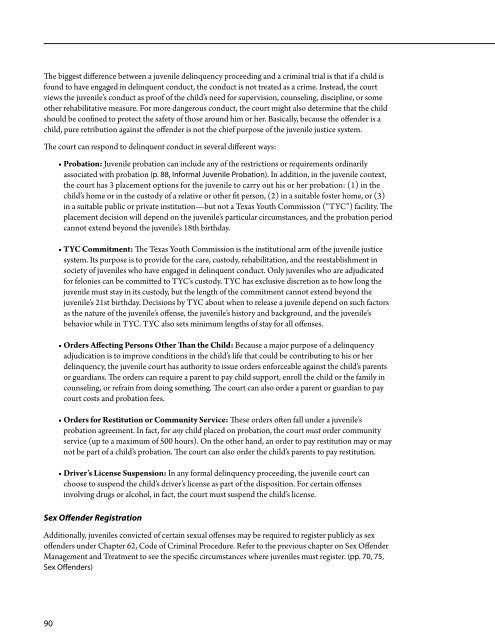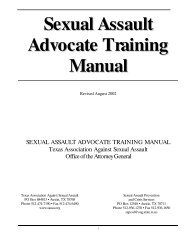Sexual aSSault LEGAL ADVOCACY MANUAL - Texas Association ...
Sexual aSSault LEGAL ADVOCACY MANUAL - Texas Association ...
Sexual aSSault LEGAL ADVOCACY MANUAL - Texas Association ...
Create successful ePaper yourself
Turn your PDF publications into a flip-book with our unique Google optimized e-Paper software.
The biggest difference between a juvenile delinquency proceeding and a criminal trial is that if a child is<br />
found to have engaged in delinquent conduct, the conduct is not treated as a crime. Instead, the court<br />
views the juvenile’s conduct as proof of the child’s need for supervision, counseling, discipline, or some<br />
other rehabilitative measure. For more dangerous conduct, the court might also determine that the child<br />
should be confined to protect the safety of those around him or her. Basically, because the offender is a<br />
child, pure retribution against the offender is not the chief purpose of the juvenile justice system.<br />
The court can respond to delinquent conduct in several different ways:<br />
• Probation: Juvenile probation can include any of the restrictions or requirements ordinarily<br />
associated with probation (p. 88, Informal Juvenile Probation). In addition, in the juvenile context,<br />
the court has 3 placement options for the juvenile to carry out his or her probation: (1) in the<br />
child’s home or in the custody of a relative or other fit person, (2) in a suitable foster home, or (3)<br />
in a suitable public or private institution—but not a <strong>Texas</strong> Youth Commission (“TYC”) facility. The<br />
placement decision will depend on the juvenile’s particular circumstances, and the probation period<br />
cannot extend beyond the juvenile’s 18th birthday.<br />
• TYC Commitment: The <strong>Texas</strong> Youth Commission is the institutional arm of the juvenile justice<br />
system. Its purpose is to provide for the care, custody, rehabilitation, and the reestablishment in<br />
society of juveniles who have engaged in delinquent conduct. Only juveniles who are adjudicated<br />
for felonies can be committed to TYC’s custody. TYC has exclusive discretion as to how long the<br />
juvenile must stay in its custody, but the length of the commitment cannot extend beyond the<br />
juvenile’s 21st birthday. Decisions by TYC about when to release a juvenile depend on such factors<br />
as the nature of the juvenile’s offense, the juvenile’s history and background, and the juvenile’s<br />
behavior while in TYC. TYC also sets minimum lengths of stay for all offenses.<br />
• Orders Affecting Persons Other Than the Child: Because a major purpose of a delinquency<br />
adjudication is to improve conditions in the child’s life that could be contributing to his or her<br />
delinquency, the juvenile court has authority to issue orders enforceable against the child’s parents<br />
or guardians. The orders can require a parent to pay child support, enroll the child or the family in<br />
counseling, or refrain from doing something. The court can also order a parent or guardian to pay<br />
court costs and probation fees.<br />
• Orders for Restitution or Community Service: These orders often fall under a juvenile’s<br />
probation agreement. In fact, for any child placed on probation, the court must order community<br />
service (up to a maximum of 500 hours). On the other hand, an order to pay restitution may or may<br />
not be part of a child’s probation. The court can also order the child’s parents to pay restitution.<br />
• Driver’s License Suspension: In any formal delinquency proceeding, the juvenile court can<br />
choose to suspend the child’s driver’s license as part of the disposition. For certain offenses<br />
involving drugs or alcohol, in fact, the court must suspend the child’s license.<br />
Sex Offender Registration<br />
Additionally, juveniles convicted of certain sexual offenses may be required to register publicly as sex<br />
offenders under Chapter 62, Code of Criminal Procedure. Refer to the previous chapter on Sex Offender<br />
Management and Treatment to see the specific circumstances where juveniles must register. (pp. 70, 75,<br />
Sex Offenders)<br />
90
















